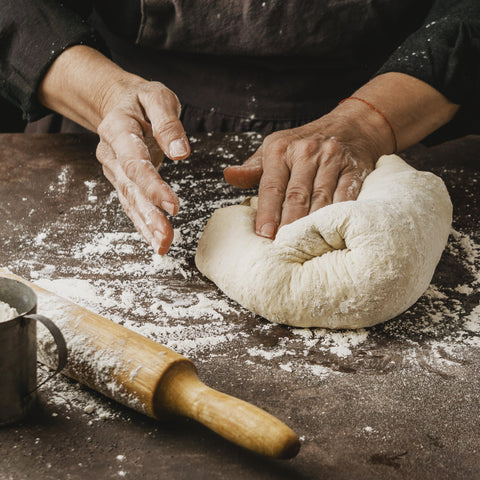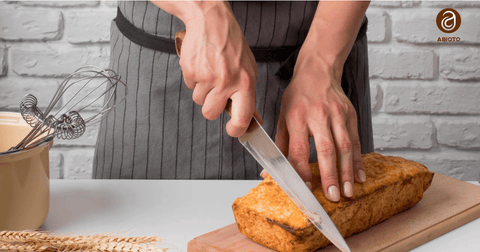If you’ve baked sourdough before, you know it’s a little wild, in the best way. It’s messy, patient, intuitive, and a bit unpredictable. That’s what makes it beautiful. But the right tools? They give you a rhythm. They help you focus less on what might go wrong and more on what’s actually working.
Sourdough isn’t about shortcuts. It’s about intention. You can’t force it. But you can support it, with tools that helps you shape, lift, score, and bake your loaves with confidence.
So if you’re ready to upgrade your homemade sourdough bread, here are the best tools for baking that’ll carry you from sticky starter to crusty golden loaf.
Why the Right Tools Matter in Sourdough?
Baking sourdough at home is nothing like baking banana bread or muffins. You’re working with a live culture. You’re stretching gluten, balancing hydration, and managing fermentation over 12-24 hours. Without the right equipment, that process gets chaotic fast.
Too sticky? Misshaped loaf? Burned bottom? Cracked crust in the wrong places? Yep, most of that comes down to gear.
You don’t need a fancy kitchen. But you do need tools that do what your hands can’t. Let’s go through them.
Must-Have Baking Tools for Delicious Homemade Sourdough
A Digital Kitchen Scale: The Foundation of Precision
Forget cups and tablespoons. A digital kitchen scale is the most essential tool in your sourdough setup. Sourdough is finicky with hydration levels, and the difference between 65% and 70% hydration can feel massive when you’re shaping sticky dough.
With a scale, you can:
-
Weigh ingredients exactly (especially flour and water)
-
Feed your starter consistently
-
Follow bakers’ percentages like a pro
-
Split the dough evenly for multiple loaves
You’ll never go back to measuring by volume again. A good scale means fewer surprises and more repeatable success.
Bench Scraper: Clean Hands, Clean Counter, Happy Dough
If you’ve worked with high-hydration dough, you know it clings to everything. Your hands, your surface, your soul. That’s where a bench scraper comes in. This simple tool helps you:
-
Lift and fold sticky dough without tearing it
-
Shape and rotate the dough with better control
-
Keep your surface clean without excess flour
It also makes cleaning up 10x easier. A few swipes and your counter’s clear. Don’t underestimate this one, it makes sourdough less stressful and more enjoyable.
Proofing Basket (Banneton): Shape with Purpose
A soft dough left to rise on a plate will slump and spread. That’s why you need a Abioto proofing basket, also known as a banneton. It gives your dough structure during the final rise and helps develop that beautiful surface texture.
The coils leave a natural flour pattern, but more than that, they:
-
Keep your loaf tall and round or oval
-
Let the surface dry slightly (great for crust development)
-
Give the dough a gentle “hug” as it ferments
Line them or go bare. Just dust with flour and let the magic happen. Once you’ve used a banneton, you’ll never look back.
Dutch Oven: Your At-Home Steam Chamber
If you want that crackly, caramelized crust and tall oven spring, a Dutch oven is non-negotiable. Your standard oven can’t create enough steam to mimic a professional bakery setup. But a Dutch oven? That’s your secret weapon.
Preheated and covered, it:
-
Traps steam during the early bake
-
Keeps the loaf moist and expanding before the crust sets
-
Distributes heat evenly, so your bread rises straight and bakes through
After about 20 minutes, you take the lid off and let the crust do its thing. Every time I skip this tool, I regret it. Seriously, this is a game-changer.
Lame (Bread Scoring Tool): Don’t Let the Dough Decide
Scoring isn’t just for looks (though it definitely helps your bread feel bakery-level). It’s actually about controlling how the bread expands in the oven. Without a score, your loaf may split at the base or in odd places.
A lame, or sharp bread scoring tool, gives you a clean, confident cut. You’re telling the dough, “This is where I want you to open.”
It also lets you express some creativity. You can go basic with a single ear or get playful with leaf and swirl patterns. Either way, it’s sharp, simple, and very satisfying.
Silicone Baking Mat or Parchment Paper: Save Your Sanity
Sticky dough, hot pots, and transferring a shaped loaf into a 500°F Dutch oven, it’s a juggling act. That’s why using a silicone baking mat or parchment paper makes so much sense.
It helps with:
-
Transferring dough without deflating it
-
Preventing sticking during the bake
-
Easier cleanup (no crust fused to the bottom)
Silicone mats are reusable. Parchment is quick and disposable. Use what fits your style. But don’t skip it, it’s the difference between smooth baking and stress.
Thermometer: Trust, But Verify
Is it done? That’s the question every sourdough baker asks at least once a week. Instead of guessing by color or sound, use a thermometer. Stick it into the center of the loaf, if it reads 200-10°F, you’re good.
But it’s not just about baking. A thermometer also helps with:
-
Checking your starter’s water temp
-
Monitoring dough temperature during bulk fermentation
-
Keeping proofing consistent in various seasons
When your bake feels off, your thermometer usually has the answer. It’s a small tool that gives you total peace of mind.
Build Your Sourdough Kit, One Tool at a Time
If this list feels long, don’t stress. Start small and build over time. A digital kitchen scale and bench scraper are great first investments. Once you’re hooked, add in a Dutch oven, proofing basket, and lame.
Each tool solves a very specific problem in the sourdough journey. And trust me, when those problems disappear, baking becomes a lot more fun.
Your starter does the fermentation. Your hands do the shaping. But these tools? They give both of those things direction.
Elevate Your Baking with Abioto Tools
At Abioto, we’re not just here to sell you stuff. We’re here to support your process. Every tool we offer is tested, crafted, and built with sourdough in mind. So whether you’re shaping your first loaf or chasing the perfect crust, we’ve got the gear to help.
Browse our sourdough kits and baking tools today, and make homemade sourdough bread feel a whole lot easier (and way more satisfying).
FAQs
What tools do you need for baking sourdough?
You’ll need a digital scale, proofing basket, Dutch oven, lame, thermometer, bench scraper, and parchment or a silicone mat.
What is the biggest mistake beginners make with sourdough bread?
Rushing fermentation or skipping important rest phases. Patience is part of the process.
What utensils to use for sourdough?
Non-reactive bowls, bench scrapers, silicone mats, sharp lames, and food-safe thermometers are all ideal.
What do I need to bake a loaf of sourdough?
Flour, water, salt, starter, and the right tools to bring it all together.




Comments (0)
There are no comments for this article. Be the first one to leave a message!